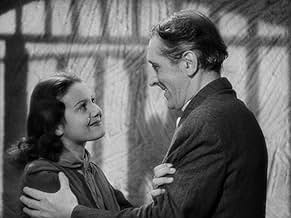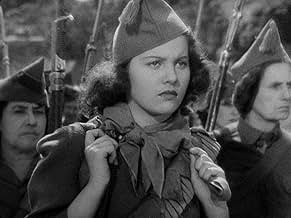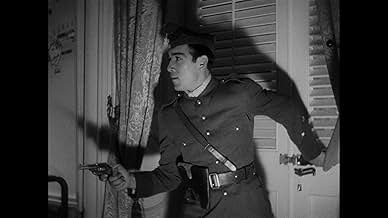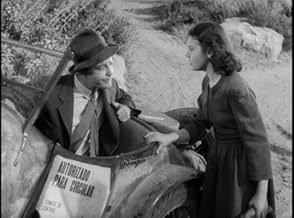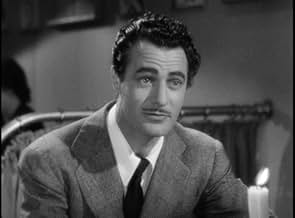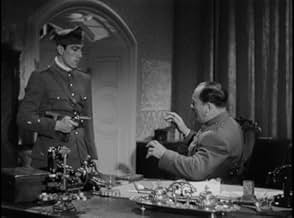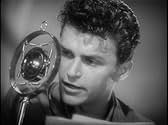Aggiungi una trama nella tua linguaThe story of seven people: their lives and love affairs in Madrid during the Civil War.The story of seven people: their lives and love affairs in Madrid during the Civil War.The story of seven people: their lives and love affairs in Madrid during the Civil War.
- Regia
- Sceneggiatura
- Star
Ricca Allen
- Elderly Refugee on Train
- (non citato nei titoli originali)
Stanley Andrews
- Secret Service Man
- (non citato nei titoli originali)
Sam Appel
- Prison Warden
- (non citato nei titoli originali)
Hooper Atchley
- Martin
- (non citato nei titoli originali)
Henry Brandon
- Radio Announcer
- (non citato nei titoli originali)
Evelyn Brent
- Woman soldier
- (non citato nei titoli originali)
Louise Carter
- Rosa Delgado
- (non citato nei titoli originali)
Maurice Cass
- Waiter
- (non citato nei titoli originali)
Recensioni in evidenza
The film is set during the Spanish Civil War which was being fought at the time and it centres around 3 unrelated groups of people trying to obtain a boarding pass for a train that will leave Madrid that night. It is the last train out of the city to freedom before the track is blown up. Destination Valencia.
Everyone has until 11:00pm to obtain a boarding pass and these passes will be rigorously checked so it is bad news for anyone who is on the run. Every group we follow as at least one character who is wanted in this way.
There is some good acting as well as some tiresome sentimentality - army deserter Robert Cummings (Ramos) and Helen Mack (Lola) get bogged down in trite dialogue with each other although their final journey to the train station has a good moment. Game over for someone. Similarly, army deserter Olympe Bradna (Maria) is too sickeningly sweet in some of her scenes with American journalist Lew Ayres (Bill). Dorothy Lamour plays the love interest for 2 friends - soldier Anthony Quinn (Alvarez) and escaped prisoner Gilbert Roland (de Soto) - but it is rather ludicrous how she is top billed. More could have been made of this love triangle but as things stand Lamour only needed to show up for one scene. She does not merit headlining this film. That privilege should go to Quinn and Roland. Also in the cast is a very effective Lionel Atwill who plays the military Colonel and Karen Morley who plays a wealthy lady and is the most interesting female character.
Quinn, Roland, Atwill and Morley give the film the excitement and are the best of the cast. The film loses interest when these characters are not on screen because we just get lovey-dovey nonsense dialogue outside of the tensions relating to the build-up to the escape from Madrid at the film's climax. Not everyone makes it out.
Everyone has until 11:00pm to obtain a boarding pass and these passes will be rigorously checked so it is bad news for anyone who is on the run. Every group we follow as at least one character who is wanted in this way.
There is some good acting as well as some tiresome sentimentality - army deserter Robert Cummings (Ramos) and Helen Mack (Lola) get bogged down in trite dialogue with each other although their final journey to the train station has a good moment. Game over for someone. Similarly, army deserter Olympe Bradna (Maria) is too sickeningly sweet in some of her scenes with American journalist Lew Ayres (Bill). Dorothy Lamour plays the love interest for 2 friends - soldier Anthony Quinn (Alvarez) and escaped prisoner Gilbert Roland (de Soto) - but it is rather ludicrous how she is top billed. More could have been made of this love triangle but as things stand Lamour only needed to show up for one scene. She does not merit headlining this film. That privilege should go to Quinn and Roland. Also in the cast is a very effective Lionel Atwill who plays the military Colonel and Karen Morley who plays a wealthy lady and is the most interesting female character.
Quinn, Roland, Atwill and Morley give the film the excitement and are the best of the cast. The film loses interest when these characters are not on screen because we just get lovey-dovey nonsense dialogue outside of the tensions relating to the build-up to the escape from Madrid at the film's climax. Not everyone makes it out.
There are several well schooled and effective actors in The Last Train From Madrid. They all give performances which, for this era of movie making, are consistent with a high level of accomplishment. Unfortunately, due to the lack of real life detail about the Spanish civil war that is the background for the movie, it does not get an overall good rating from this 21st century commenter (who has made use of the contemporary historical writings that are now available about the Republican/Francoist civil war). Although this film is made early in the career of Anthony Quinn his part, such as it is, gives a 21st century person some evidence of why Mr. Quinn's career grew so rapidly. Some actors labor for years, crafting an image that eventually rises to a level to be appreciated by the general public. When one looks at the complete works of Anthony Quinn it is evident that he also worked hard at the craft of acting and developed a manner of presentation that became more and more effective as the years progressed. However, from the very early Anthony Quinn presentations one sees a persona that, even though a work in progress, carries the strength of actors who had much more experience and schooling in the trade.
Another commenter lamented that the movie did not have any big name actors. I guess the performances of Dorothy Lamour, Gilbert Roland, and Robert Cummings were somehow missed by the commenter. While without historical merit, the film is entertaining and provides a window into the acting methods of early 20th century film making.
Another commenter lamented that the movie did not have any big name actors. I guess the performances of Dorothy Lamour, Gilbert Roland, and Robert Cummings were somehow missed by the commenter. While without historical merit, the film is entertaining and provides a window into the acting methods of early 20th century film making.
Seeing this film over 75 years after it came out you had to wonder about how Hollywood treated this film as history. During the time we cannot tell who's occupying Madrid and who's being a traitor to who. That word is flung about in The Last Train To Madrid. But if you know nothing about the Spanish Civil War you would not know it was the Loyalists that occupied Madrid. Loyalists/Republicans held the Spanish capital and two years later the surrender of Madrid signaled the end of the War in a Nationalist triumph. Two years after this film was seen by our movie-going public.
In 1936 the war started as a revolt of the army against the duly elected Republican government. It is discussed by historians to this day as to whether they were justified. But they did it and when Lionel Atwill calls Anthony Quinn a traitor I'm not sure who was betraying what. Part of the plot calls for Quinn to aid his old friend Gilbert Roland who's with the other side escape Madrid. But I can only guest that Atwill is part of the army Nationalist Revolt and Quinn has betrayed it and Roland even more so by being loyal to the Spanish Republic.
The Last Train From Madrid has the city besieged and there will be a last train going out before the tracks are destroyed. Passes will be issued on a limited basis and they become as valued as those famous Letters of Transit in Casablanca. The film is the story of those trying to leave Madrid and how successful they are.
A bit of Grand Hotel, a bit of Shanghai Express is the best way to describe this film. It would rate higher with me if it was more explicit.
In 1936 the war started as a revolt of the army against the duly elected Republican government. It is discussed by historians to this day as to whether they were justified. But they did it and when Lionel Atwill calls Anthony Quinn a traitor I'm not sure who was betraying what. Part of the plot calls for Quinn to aid his old friend Gilbert Roland who's with the other side escape Madrid. But I can only guest that Atwill is part of the army Nationalist Revolt and Quinn has betrayed it and Roland even more so by being loyal to the Spanish Republic.
The Last Train From Madrid has the city besieged and there will be a last train going out before the tracks are destroyed. Passes will be issued on a limited basis and they become as valued as those famous Letters of Transit in Casablanca. The film is the story of those trying to leave Madrid and how successful they are.
A bit of Grand Hotel, a bit of Shanghai Express is the best way to describe this film. It would rate higher with me if it was more explicit.
Before America's involvement in the Second World War, Hollywood's attitudes towards events in Europe were, to say the least, ambiguous
Greed (the fear of losing foreign markets), and the threat of backlash from powerful isolationist groups within the country meant that the films tended to avoid the controversial issues of fascism
Hollywood as a whole though there were a few dedicated anti-fascists prided itself on not taking sides
Two films claiming to be about the Spanish Civil War somehow managed to evade mentioning who the combatants were and what the fighting was about
'The Last Train From Madrid' is a conventional melodrama about the plight of a group of people waiting to board the last train out of a besieged Madrid The war has no other function here than to provide the element of suspense More serious is 'Blockade,'1938 directed by William Dieterle The film stars Henry Fonda as a Spanish peasant who reluctantly takes arms to defend his country
Two films claiming to be about the Spanish Civil War somehow managed to evade mentioning who the combatants were and what the fighting was about
'The Last Train From Madrid' is a conventional melodrama about the plight of a group of people waiting to board the last train out of a besieged Madrid The war has no other function here than to provide the element of suspense More serious is 'Blockade,'1938 directed by William Dieterle The film stars Henry Fonda as a Spanish peasant who reluctantly takes arms to defend his country
Hollywood tiptoed on eggshells when it came to the Spanish Civil War. This film is no exception. The plot is similar in style to MGM's "Grand Hotel" where separate stories are intermingled with the plot. The most interesting part of this film for me was the depiction of a woman's column marching to the front. But then one of the women sounded like she was from the Bronx and we never found out what happened to the column. Some of the acting is over the top like the dialog. But it is always fun to see Anthony Quinn,Lionel Atwill and Gilbert Roland. Bits of newsreel from the bombing of what appears to be Madrid are spliced in between the Hollywood back lot sets.
Lo sapevi?
- QuizDe Soto refers to "Damon and Pythias" in describing his relationship with the group of five soldiers. Damon and Pythias are figures from Greek legend that are used to demonstrate the meaning of true friendship. Damon trusted Pythias so much that he was willing to put his life on the line. This theme is echoed in the relationship between de Soto and Alvarez.
- BlooperWhen Bill Dexter and Maria Ronda are going to see her father in prison, as they are handing their pass to a guard, a moving shadow of a crew member holding a boom microphone is visible on the wall behind them.
- ConnessioniReferenced in Hollywood Mouth 2 (2014)
I più visti
Accedi per valutare e creare un elenco di titoli salvati per ottenere consigli personalizzati
- How long is The Last Train from Madrid?Powered by Alexa
Dettagli
- Data di uscita
- Paese di origine
- Lingua
- Celebre anche come
- Poslednji voz iz Madrida
- Luoghi delle riprese
- Azienda produttrice
- Vedi altri crediti dell’azienda su IMDbPro
- Tempo di esecuzione1 ora 25 minuti
- Colore
- Proporzioni
- 1.37 : 1
Contribuisci a questa pagina
Suggerisci una modifica o aggiungi i contenuti mancanti

Divario superiore
By what name was The Last Train from Madrid (1937) officially released in India in English?
Rispondi
